List of political parties in Poland
This article lists current political parties in Poland, as well as former parties dating back as far as 1918. Since 1989, Poland has had a multi-party system, with numerous competing political parties. Individual parties normally do not manage to gain power alone, and usually work with other parties to form coalition governments.
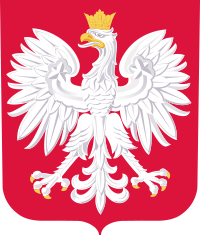 |
|---|
| This article is part of a series on the politics and government of Poland |
|
|
|
|
Related topics
|
The transition from a mono-party Communist regime to liberal democracy and pluralism resulted in new political parties mushrooming in the early 1990s. After the first free parliamentary elections in 1991 seats in the Sejm were divided among more than a dozen different parties (amongst them such curiosities as the Polish Beer-Lovers' Party (Polska Partia Przyjaciół Piwa), led by a popular comedy actor, Janusz Rewiński). The existence of so many parties in the Sejm was seen by many as being counterproductive to the effectiveness of the parliament and a hindrance towards producing stable governments. Consequently, electoral reform was undertaken and an electoral threshold for the Lower House was instituted prior to the 1993 elections. The set threshold required a minimum vote of 5% for parties (with exemptions for ethnic minority parties) and 8% for electoral coalitions. The threshold was set at the national, rather than divisional, level, and had the effect of preventing many minor parties from winning seats in later elections. The threshold also prevented independent candidates from gaining election to the Sejm. Since 1990, the left side of the political scene has generally been dominated by former Communists turned social democrats. The right has largely comprised (former) Solidarity activists and supporters, but experienced deep divisions from the beginning, and showed less cohesiveness than the left. The right were unable to create a single bloc which could act as a lasting counterweight to the left-wing monolith, but instead, kept merging, splitting and renaming. Even so, the parties of the right did manage to win government again from 1997-2001 (having initially governed from 1989–93).
Since the parliamentary elections of 2005, the right-wing parties have dominated the political scene, and appear to be in their strongest position to date. Two important developments in the political landscape have taken place since 2005. Firstly, the SLD (Communist successor) party is no longer the major, or one of the two major parties. Secondly, the main political battleground is no longer between the ex-Solidarity right versus the ex-Communist left. The new competing groupings are those of the Law and Justice party (promoting economic interventionism and social conservatism) and the Civic Platform (representing a more liberal-conservative position). The general public disapproval of politics and politicians as a whole has resulted in almost all major parties excluding the very word "party" from their names, replacing it with words less associated with politics, such as "union", "platform", "league" or "alliance".
Parliamentary parties
| Logo | Party | Leader | Ideology | National affiliation | European affiliation | Representation | Comments | ||||
|---|---|---|---|---|---|---|---|---|---|---|---|
| Sejm | Senat | EP | |||||||||
| Law and Justice Prawo i Sprawiedliwość |
PiS | Jarosław Kaczyński | National conservatism Christian democracy Solidarism |
United Right | ACRE | 198 | 44 | 24 | Party was founded in 2001 by the Kaczyński twins, Lech and Jarosław. It was formed from part of the Solidarity Electoral Action (AWS), with the Centre Agreement forming the new party's core. Along with PO, one of the two major parties since 2005, first entering the Sejm in 2001. It was the leading party in government from 2005–2007 and again from 2015-present. It started as centre-right party, but shifted more to the right-wing later. | ||
| Civic Platform Platforma Obywatelska |
PO | Borys Budka[1] | Catch-all Centrism Liberalism |
Civic Coalition | EPP | 119 | 42 | 14 | One of the two major parties on the Polish political scene since 2005, PO first entered the Sejm in 2001. Leading party in government from 2007-2015. Used to be liberal-conservative, but in the course of time, became catch-all party with right and left wings. | ||
| Democratic Left Alliance Sojusz Lewicy Demokratycznej |
SLD | Włodzimierz Czarzasty | Social democracy Anti-clericalism Social liberalism |
The Left | PES | 24 | 0 | 5 | The largest left-wing party on the political scene. SLD was the major party of government from 1993–1997 and 2001–2005. Since 2005, its dominance has been successfully challenged by PO and PiS. In the 2015 parliamentary election United Left received 7.6% of the vote, below the 8% threshold (electoral alliances must win at least 8% of the vote, as opposed to the 5% for individual parties), leaving SLD without parliamentary representation for the first time. SLD returned to the parliament in 2019. | ||
| Polish People's Party Polskie Stronnictwo Ludowe |
PSL | Władysław Kosiniak-Kamysz | Agrarianism Christian democracy Centrism |
Polish Coalition | EPP | 23 | 2 | 3 | Rural party represented in the Sejm since its inception. Support levels for them have been more stable than for any other Polish political party since 1989. It normally scores 7–9% of the popular vote, and achieved its best result at the 1993 legislative elections, where it polled over 15%. | ||
| Spring Wiosna |
WRB | Robert Biedroń | Anti-clericalism Progressivism Social democracy |
The Left | PES | 19 | 1 | 2 | Party founded in 2019 by former MP and mayor of Słupsk, Robert Biedroń. It won 3 seats in 2019 European Parliament elections. | ||
| United Poland Solidarna Polska |
SP | Zbigniew Ziobro | Solidarism National conservatism Social conservatism |
United Right | ACRE | 18 | 2 | 2 | Party was founded in 2012 by PiS MEP Zbigniew Ziobro, who led the party's Catholic-nationalist faction. Similarly to Agreement, it is allied with Law and Justice, as part of the United Right coalition. Its MPs and Senators sit in the PiS parliamentary club. | ||
| Agreement Porozumienie |
Jarosław Gowin | Liberal conservatism Economic liberalism Republicanism |
United Right | ACRE | 18 | 2 | 1 | Party founded in November 2017 by Deputy Prime Minister and Minister of Science and Higher Education Jarosław Gowin as an expansion of his previous party, Poland Together. It is allied with Law and Justice, as part of the United Right coalition. Its MPs and Senators sit in the PiS parliamentary club. | |||
| Modern Nowoczesna |
.N | Adam Szłapka | Liberalism Economic liberalism Social progressivism |
Civic Coalition | ALDE | 8 | 1 | 0 | Party founded in late May 2015 by the former World Bank economist Ryszard Petru, who left it in 2018. Cooperated with Civic Platform as part of Civic Coalition and European Coalition. | ||
 |
Kukiz'15 Kukiz'15 |
K'15 | Paweł Kukiz | Pro-single-member districts Populism Direct democracy |
Polish Coalition | 6 | 0 | 0 | Political movement led by punk rock musician turned politician Paweł Kukiz. It is an association and not registered as a political party. It was founded after Kukiz stood in the 2015 presidential election, winning 21% of the vote and coming in third during the election's first round. The primary issue of movement is the replacement of Poland's proportional representation electoral system with single member constituencies. | ||
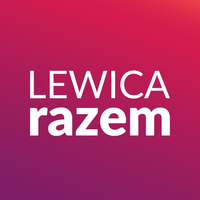 |
Left Together Lewica Razem |
LR | Collective leadership | Democratic socialism Left-wing populism Feminism |
The Left | DiEM25 | 6 | 0 | 0 | Party was founded as a response to the unsuccessful attempt to create a left-wing political platform in Poland during the 2015 presidential election. Another reason was dissatisfaction with the role of the post-communist Democratic Left Alliance as the main left-wing party. Many founders were previously activists in the Young Socialists, The Greens or local initiatives. Razem registered lists for the 2015 parliamentary election in all electoral districts and received 3.6% of the vote in the election, below the 5% threshold to gain seats in parliament. | |
| KORWiN KORWiN |
KORWiN | Janusz Korwin-Mikke | Paleolibertarianism Laissez-faire Anti-socialism |
Confederation | IALP (international affiliation) | 5 | 0 | 0 | Party established in 2015 by Janusz Korwin-Mikke as a result of his removal from his former party, Congress of the New Right. Until October 2016 and since December 2018, the party is also known as Coalition for the Renewal of the Republic – Liberty and Hope. The party's Polish name is a backronym of the founder's name (KORWiN). | ||
| National Movement Ruch Narodowy |
RN | Robert Winnicki | Polish nationalism Anti-immigration Souverainism |
Confederation | 5 | 0 | 0 | Party formed as an electoral alliance of right-wing and far-right nationalist political movements, which have signed an ideological agreement, including nationalists from National Radical Camp and the All-Polish Youth, Real Politics Union, the only political party taking part in the agreement. It was established after the Polish Independence March in 2012. | |||
| Polish Initiative Inicjatywa Polska |
IPL | Barbara Nowacka | Progressivism Social democracy Anti-clericalism |
Civic Coalition | 4 | 0 | 0 | Party created by former leader of United Left coaliton Barbara Nowacka. It cooperates with the biggest opposition party PO. | |||
 |
The Greens Zieloni |
Wojciech Kubalewski Małgorzata Tracz[2] |
Green politics Alter-globalism Progressivism |
Civic Coalition | EGP | 3 | 0 | 0 | Party was founded in September 2003 under the name "Greens 2004" (Polish: Zieloni 2004) and formally registered in February 2004. It was represented in the Sejm between 2014-2015 by Anna Grodzka (elected from Palikot's Movement). In the 2018 local elections, the Greens, without any electoral alliance, managed to obtain the highest ever result in their party history of 1.15% of the votes. In 2019 they joined European Coalition. | ||
 |
Union of European Democrats Unia Europejskich Demokratów |
UED | Elżbieta Bińczycka | Liberalism Social liberalism Centrism |
Polish Coalition | ALDE | 1 | 1 | 0 | Party founded by former Democratic Party – demokraci.pl members and former members of parliament from Civic Platform. The name refers to the tradition of the Democratic Union and the Freedom Union, of which it is the successor. | |
| Republican Party Partia Republikańska |
Anna Siarkowska | Republicanism Conservative liberalism National liberalism |
United Right | 1 | 0 | 0 | In 2017, the leaders of the Republican Foundation and MPs Anna Siarkowska and Małgorzata Janowska (elected from Kukiz'15) established the Republican Party, which is the political representation of the Foundation. The MPs joined the parliamentary club of the Law and Justice (with which party has been cooperating since the beginning). | ||||
| Confederation of the Polish Crown Konfederacja Korony Polskiej |
Korona | Grzegorz Braun | Monarchism Reactionism Laissez-faire |
Confederation | 1 | 0 | 0 | Party created by movie director and politician Grzegorz Braun in 2019. It is the third most important member of the Confederation after KORWiN and National Movement. | |||
| German Minority Mniejszość Niemiecka |
MN | Ryszard Galla | German minority interests Regionalism |
1 | 0 | 0 | German Minority Electoral Committee are representatives of the German minority in the Sejm. Candidates of the German minority are proposed by the Social-Cultural Association of Germans in Silesian Opole and the Social-Cultural Association of Germans in Silesian Voivodeship. | ||||
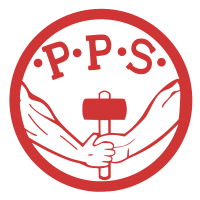 |
Polish Socialist Party Polska Partia Socjalistyczna |
PPS | Wojciech Konieczny | Democratic socialism Social patriotism Ethical socialism |
The Left | 0 | 1 | 0 | PPS was one of the most important parties in Poland from its inception in 1892 until its dissolution in 1948. A party with the same name was established in 1987, but has remained at the margins of Polish politics. Józef Piłsudski, founder of the resurrected Polish state, was a member and later leader of the PPS in the early 20th century. | ||
Parties without representation
Far-left
| Logo | Party | Leader | Ideology | European affiliation | Comments | ||
|---|---|---|---|---|---|---|---|
.png) |
Polish Communist Party Komunistyczna Partia Polski |
KPP | Krzysztof Szwej | Communism Stalinism Anti-revisionism |
INITIATIVE | Party was founded in 2002 as the successor of the Union of Polish Communists "Proletariat", which was founded in 1990. It is considered to be the historical and ideological heir of the Communist Party of Poland, which operated from 1918 to 1938. | |
| Edward Gierek's Economic Revival Movement Ruch Odrodzenia Gospodarczego im. Edwarda Gierka |
ROG | Paweł Bożyk | Socialism Anti-capitalism Anti-Atlanticism |
Party refers to the achievements of Edward Gierek's (I Secretary of the Central Committee of the Polish United Workers' Party in 1970-1980) rule. It is against Poland's membership in NATO and postulated the withdrawal of troops from Iraq. | |||
| Social Justice Movement Ruch Sprawiedliwości Społecznej |
RSS | Piotr Ikonowicz | Socialism Anti-capitalism Left-wing populism |
Party founded in 2014 by famous social activist Piotr Ikonowicz. It was based on his Social Justice Chancellery. Before the presidential elections in 2015, party supported candidate of The Greens Anna Grodzka, who did not collect required number of signatures. | |||
Left-wing
| Logo | Party | Leader | Ideology | European affiliation | Comments | ||
|---|---|---|---|---|---|---|---|
| Action of Disappointed Retirees and Pensioners Akcja Zawiedzionych Emerytów Rencistów |
AZER | Wojciech Kornowski | Pensioners' rights Solidarism |
Party was founded in 2018 by former leader of The Confederation of Polish Employers, Wojciech Kornowski. Its main goal is protecting retired seniors, pensioners and trust-busting. | |||
 |
Feminist Initiative Inicjatywa Feministyczna |
IF | Iwona Piątek Elżbieta Jachlewska Katarzyna Kądziela |
Radical feminism Women's rights Progressivism |
Party was registered in 2007 and was known as "Women's Party" (Partia Kobiet) until 2016. In 21 October 2007 National Assembly election, it won 0.28% of the popular vote and no seats in the Sejm or the Senate. | ||
| National Party of Retirees and Pensioners Krajowa Partia Emerytów i Rencistów |
KPEiR | Tomasz Mamiński | Pensioners' rights Social democracy |
Party was founded in 1994. It lost its first parliamentary election in 1997 winning just 2.18% and no seat in Sejm and Senate. In the parliamentary elections in 2015, several activists of KPEiR competed for the Sejm from the lists of the United Left, which did not obtain any seats. | |||
| Better Poland Lepsza Polska |
LP | Cezary Stachoń | Green politics Egalitarianism Solidarism |
Small green party which never stood in any elections. | |||
| Peasants' Party Partia Chłopska |
PCh | Krzysztof Filipek | Agrarian socialism Left-wing nationalism Left-wing populism |
Party founded by Krzysztof Filipek and other former members of Self-Defence. | |||
| Polish Party of Animal Protection Polska Partia Ochrony Zwierząt |
PPOZ | Andrzej Olszewski | Animal rights Animal welfare Environmentalism |
Party aspires to turn away from the anthropocentric view of life. Its main goal is the introduction of more animal rights. | |||
| Self-Defence of the Republic of Poland Samoobrona Rzeczypospolitej Polskiej |
SRP | Lech Kuropatwiński | Agrarian socialism Left-wing nationalism Left-wing populism |
Founded by Andrzej Lepper in 1992, the party initially fared poorly. However, it was catapulted to prominence in the 2001 parliamentary election, winning 53 seats, after which it gave confidence and supply to the SLD government. It elected 6 MEPs in 2004 and switched its support to PiS after the 2005 election, in which it won 56 seats. Lepper was appointed Deputy Prime Minister in the coalition government with PiS and the LPR. In 2007, he was dismissed from his position and the party withdrew from the coalition. This precipitated a new election, at which the party collapsed to just 1.5% of the vote losing all its seats. | |||
| Self-Defence Rebirth Samoobrona Odrodzenie |
SO | Agrarian socialism Left-wing nationalism Left-wing populism |
Party was founded in 2007 from the merger of the Self-Defense Social Movement party and several other marginal groups formed by splitters from the Self-Defense of the Republic of Poland. | ||||
 |
Labour Union Unia Pracy |
UP | Waldemar Witkowski | Social democracy Anti-clericalism Progressivism |
PES | Small social-democratic party which usually aligns itself with the Democratic Left Alliance. It was founded in 1992 by left-wing anti-communist politicians. | |
| Liberty and Equality Wolność i Równość |
WiR | Piotr Musiał | Democratic socialism Progressivism Anti-clericalism |
Party founded in 2005 as a Union of the Left, in 2015 its name was changed to Liberty and Equality. It usually takes part in elections as part of coalitions of larger left-wing parties. | |||
Centre-left
| Logo | Party | Leader | Ideology | European affiliation | Comments | ||
|---|---|---|---|---|---|---|---|
| Polish Left Polska Lewica |
PL | Jacek Zdrojewski | Social democracy Social liberalism Third Way |
Party was formed in 2007 when former Prime Minister Leszek Miller and many other members of parliament withdrew from the Democratic Left Alliance, which Miller had headed for many years. His departure also served as a public protest against the policies of party leaders. In 2010 Miller left the party and decided to return to SLD. | |||
| Social Democracy of Poland Socjaldemokracja Polska |
SDPL | Wojciech Filemonowicz | Social democracy Social liberalism Progressivism |
Party was founded in 2004 as a splinter group from Democratic Left Alliance. SDPL contested its first elections in 2004. Party gained 5.3%, which saw 3 members elected to the European Parliament. In 2005 they managed to gain 3.9% of the vote and fell short of the 5% threshold. SDPL put forward its leader Marek Borowski as candidate for the presidential elections. He came 4th winning 10.3% of the vote. SDPL usually takes part in elections as part of coalitions. | |||
 |
Your Movement Twój Ruch |
TR | Janusz Palikot | Progressivism Social liberalism Anti-clericalism |
Party was founded by Janusz Palikot, a former Civic Platform MP, in 2010, as Palikot's Movement. It adopted its current name in 2013. In 2011 parliamentary election, party received 10% of the vote and won 40 seats in the Sejm, making it the third party behind Civic Platform and Law and Justice, one of the best debut performances for a party since the end of communism. In 2015 parliamentary election United Left list was led by Your Movement's Barbara Nowacka and received only 7.6% of the vote, below the 8% threshold, leaving TR without parliamentary representation. | ||
Centre
| Logo | Party | Leader | Ideology | European affiliation | Comments | ||
|---|---|---|---|---|---|---|---|
 |
Direct Democracy Demokracja Bezpośrednia |
DB | Marzena Petykiewicz | Direct democracy E-democracy Progressivism |
Party's creation has been inspired by the 2012 protests against ACTA. In the elections to the European Parliament in 2014, DB set up its own committee, which received 0.23% of the votes. In the 2015 presidential election, DB's candidate was Paweł Tanajno, who took the last place with 0.2% of votes. In the parliamentary elections in 2015, five DB activists (including Tanajno) entered the Sejm from lists of the Kukiz'15. None of them received a mandate. | ||
| One-PL Jeden-PL |
1PL | Włodzimierz Zydorczak | Eurofederalism Liberalism Direct democracy |
Party founded as Civic Republic of Poland. | |||
| Confederation of Independent Poland Konfederacja Polski Niepodległej |
KPN | Władysław Borowiec | Sanationism Anti-communism Syncretic politics |
Party founded in 1979 by Leszek Moczulski and others declaring support for the pre-war traditions of Sanacja and Józef Piłsudski. It was the first independent political party that was publicly proclaimed in the Eastern Bloc. After the fall of communism, Leszek Moczulski got only 2.5% of votes in 1990 presidential election. In 1991 parliamentary election the party got 7.5% of the vote, while in the 1993 parliamentary election it received 5.7%. | |||
| Party of Drivers Partia Kierowców |
PK | Halszka Bielecka | Drivers' rights Liberalism Anti-bureaucratism |
Created in 2019. Member of Confederation. | |||
| Polish Internet Party Polska Partia Internetowa |
PPI | Leszek Lacheta | Green liberalism E-democracy Liberalism |
Founded in 2019. Party combines ecologic stances with economic liberalism. | |||
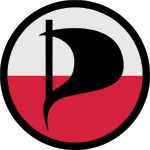 |
Polish Pirate Party Polska Partia Piratów |
P3 | Michał Dydycz | Pirate politics Liquid democracy Freedom of information |
PPEU | Before European Parliament elections in 2014, party concluded an agreement with Direct Democracy, by virtue of which its activists were included in the lists of the DB committee, which received 0.23% of the votes. In the local elections of the same year, Tomasz Słowiński was nominated by Congress of the New Right as candidate in Skierniewice presidential elections, taking the last, 6th place with slightly more than 2% support. | |
| Polish Alliance of Democrats Polskie Stronnictwo Demokratyczne |
PSD | Krzysztof Góralczyk | Christian democracy Liberalism Centrism |
Party founded in 2013 by Christian democratic wing of Alliance of Democrats. It started transient cooperation with Poland Together. | |||
| Enterprising Republic of Poland Przedsiębiorcza Rzeczypospolita Polska |
PRP | Robert Krzemiński | Economic liberalism Anti-bureaucratism Populism |
Main postulates of party include liberalisation of economy, reduction of taxes and introduction of criminal and financial responsibility of officials. | |||
| Alliance of Democrats Stronnictwo Demokratyczne |
SD | Paweł Piskorski | Liberalism Social liberalism Centrism |
EDP | Party has its origins in the Democratic Clubs, which were opposed to authoritarian tendencies in Poland between the two World Wars. The first club was founded in Warsaw in 1937. In the People's Republic of Poland SD became a satellite party of the communist Polish United Workers' Party regime. After 1990, most of the members of the SD joined other parties, such as the Freedom Union. Party continued to exist, but had only a small support base, and was not represented in parliament. | ||
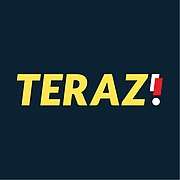 |
Now! Teraz! |
T! | Ryszard Petru | Economic liberalism Neoliberalism Social progressivism |
ALDE | Party was founded on 17 November 2018 by Ryszard Petru and Joanna Scheuring-Wielgus as a split from the Modern party which Petru was also a founder. His partner Joanna Schmidt, the vice-president of ALDE also defected. Party lost its parliamentary seats in 2019. | |
Centre-right
| Logo | Party | Leader | Ideology | European affiliation | Comments | ||
|---|---|---|---|---|---|---|---|
| Christian Democracy of the 3rd Polish Republic Chrześcijańska Demokracja III Rzeczypospolitej Polskiej |
ChDRP | Lech Wałęsa | Christian democracy Social conservatism Social market economy |
Party founded in 1997 by former president Lech Wałęsa. It took the German CDU as a role model. In 2000 Wałęsa ran in the presidential election, receiving 1.01% of votes (he took 7th place out of 12 candidates). | |||
 |
League of Polish Families Liga Polskich Rodzin |
LPR | Witold Bałażak | Conservatism Social conservatism Christian democracy |
LPR was created just before parliamentary elections in 2001 as a far-right nationalist party and gained 8% of the vote. In 2004 elections to the European Parliament LPR received 15.2% votes, which gave it 10 out of 54 seats reserved for Poland. This made the LPR the second largest party in Poland in that election. In 2005 elections LPR again received 8% of votes and formed government coalition with Law and Justice and Self-Defence. In 2007 parliamentary election it failed to gain the 5% of votes and lost all its seats. In the following years party became more moderate. It usually supports candidates of PO and PSL. | ||
| Freedom Party Partia Wolności |
PW | Anna Karbowska | Conservative liberalism Economic liberalism Republicanism |
Party founded by moderate splitters from Congress of the New Right and "The Republicans" Association. | |||
| Effective Skuteczni |
Piotr Liroy-Marzec | Classical liberalism Economic liberalism Direct democracy |
Party created in 2018 by former rapper and MP Liroy. It cooperated with Confederation in 2019 European Parliament elections, but left the coalition a few weeks later. | ||||
| People's Party "Patrimony" Stronnictwo Ludowe "Ojcowizna" |
SL"O" | Kazimierz Chorzępa | Agrarianism Social conservatism Solidarism |
Party refers to the Polish People's-Christian Forum "Patrimony" - a party operating in the years 1991-1997. Many activists of trade union "Solidarity of Individual Farmers" belong to "Patrimony". Its founder Roman Bartoszcze was a candidate in 1990 presidential elections. | |||
 |
"Piast" Party Stronnictwo Piast |
Zdzisław Podkański | Agrarianism Social conservatism Christian democracy |
Party was formed in 2006 as a result of the break-up in PSL and the departure of the right wing of the party. Its name refers both to the Polish medieval Piast dynasty and to the pre-war conservative party PSL Piast. | |||
| Labour Party Stronnictwo Pracy |
SP | Zbigniew Wrzesiński | Solidarism Christian democracy Social market economy |
Party was founded in 1989 on the initiative of the activists of the Christian Democratic Club of Political Thought. In 1990 the name Christian-Democratic Labour Party (ChDSP) was adopted. It referred to the Labour Party operating in the years 1937-1950. | |||
Right-wing
| Logo | Party | Leader | Ideology | European affiliation | Comments | ||
|---|---|---|---|---|---|---|---|
| Social Alternative Alternatywa Społeczna |
AS | Krzysztof Przybylak | Right-wing populism National conservatism Christian right |
Party was founded by Piotr Wroński - Colonel of the Intelligence Agency and a former officer of Polish Special Services. | |||
| Europe of Free Fatherlands - Polish Party Europa Wolnych Ojczyzn – Partia Polska |
EWO-PP | Jan Szczepankiewicz | Anti-Lisbon Treaty National liberalism Souverainism |
Marginal party was founded in 2008 as an opposition to the Lisbon Treaty. | |||
| Decent Life Godne Życie |
GŻ | Grzegorz Masierowski | Direct democracy Right-wing populism Souverainism |
Small populist party which never participated in any elections. | |||
| Unity of the Nation Jedność Narodu |
JN | Romuald Starosielec | National conservatism National liberalism Ordoliberalism |
Party registered one list in 2019 European Parliament election. It won 0.02% of the vote. | |||
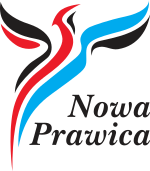 |
Congress of the New Right Kongres Nowej Prawicy |
KNP | Stanisław Żółtek | Libertarian conservatism National liberalism Conservative liberalism |
MENF | Party was founded in 2011 by Janusz Korwin-Mikke, from the merger of Liberty and Lawfulness with several members of Real Politics Union. The former leader Korwin-Mikke was ousted from the party in 2015, which caused massive decline in its support. | |
| National League Liga Narodowa |
LN | Zbigniew Lipiński | National democracy National conservatism Souverainism |
Party was originally registered in 2007 as a National People's Movement (and operated under this name until 2013). It was founded mainly by former activists of League of Polish Families and Self-Defence. As RLN it had agrarian-nationalist character, while as LN it refers only to national democracy. | |||
| League of Defence of Sovereignty Liga Obrony Suwerenności |
LOS | Wojciech Podjacki | Souverainism Anti-globalism National conservatism |
Party is in favour of full sovereignty of Poland. It opposed Poland's accession to the European Union and is in favour of protecting the Polish economy against unfair competition from foreign capital. It recognized King Bolesław Chrobry as its patron. The 18 April (date of the coronation of Bolesław Chrobry as King of Poland in 1025) is celebrated as a party holiday. | |||
| Normal Country Normalny Kraj |
NK | Wiesław Lewicki | Conservative liberalism Economic liberalism Anti-communism |
Marginal party founded by splitters from Congress of the New Right and "The Republicans" Association. | |||
| Defence of the Polish Nation Obrona Narodu Polskiego |
ONP | Tadeusz Mazanek | Agrarianism National conservatism National Catholicism |
Party was originally registered in 2005 as a Self-Defence of the Polish Nation (it operated under this name for a year). It was founded by nationalist splitters from Self-Defence of the Republic of Poland. | |||
| PolEXIT PolEXIT |
Stanisław Żółtek | Polexit Souverainism Populism |
Satellite party of KNP, established for the elections to the European Parliament in 2019. It registered lists in 2 constituencies. | ||||
| Patriotic Poland Polska Patriotyczna |
PP | Paweł Ziemiński | National Catholicism Solidarism Agrarianism |
Party founded in 2008 by activists of the Patriotic Self-Defence (acting parallel to this group until 2013). | |||
| Polish Monarchist Movement Polski Ruch Monarchistyczny |
PRM | Leszek Wierzchowski | Monarchism Reactionarism Christian right |
The founder, leader and regent of party is Leszek Wierzchowski. PRM confirms old titles of nobility and aristocracy and awards new ones "for merit". It also awards its own orders and decorations. Party is in favour of a state governed by a hereditary king in the system of constitutional monarchy. It considers the Constitution of 3 May to be the foundation of its actions. | |||
| Polish Agreement Porozumienie Polskie |
PP | Jan Łopuszański | National conservatism National Catholicism Souverainism |
Party was founded in 1999 by splitters from the Solidarity Electoral Action. In 2000 presidential election Jan Łopuszański won 0.79% of the vote. Before parliamentary elections in 2001, PP joined League of Polish Families, maintaining its independence. Party won 3 seats. In 2003 cooperation was terminated and PP lost its importance. | |||
| Right Wing of the Republic Prawica Rzeczypospolitej |
PR | Krzysztof Kawęcki | Political Catholicism Social conservatism Ordoliberalism |
ECPM | Party founded by former Marshal of the Sejm Marek Jurek on 20 April 2007 after he had left Law and Justice on 16 April 2007, when the Sejm failed to pass a constitutional amendment protecting prenatal life. It positions itself as a Christian conservative party with a strong focus on family rights and a pro-life stance. | ||
| People's National Covenant Przymierze Ludowo-Narodowe |
PLN | Andrzej Turek | Agrarianism National conservatism Souverainism |
Marginal party with agrarian-nationalist agenda. | |||
| National-Catholic Movement Ruch Katolicko-Narodowy |
RKN | Małgorzata Romanowicz | National Catholicism National conservatism Political Catholicism |
Party created in 1997 by famous politician Antoni Macierewicz. He left it in 2012. | |||
| Real Europe Movement Ruch Prawdziwa Europa |
RPE | Mirosław Piotrowski | Political Catholicism Christian fundamentalism Social conservatism |
Party created in 2019 by former PiS MEP Mirosław Piotrowski, who belonged to party's fundamentalist faction. | |||
| Party of Polish National Interest Stronnictwo Polska Racja Stanu |
SPRS | Józef Kurecki | National conservatism National Catholicism Solidarism |
In 2000 party's candidate Dariusz Grabowski won 0.51% of the vote in presidential election. It was the first and last start of the party in any elections. | |||
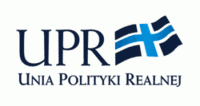 |
Real Politics Union Unia Polityki Realnej |
UPR | Bartosz Józwiak | National liberalism National conservatism Economic liberalism |
Created as libertarian conservative party in 1987, became more nationalist after its most prominent politician Janusz Korwin-Mikke left it in 2009. UPR cooperated with National Movement in the European Parliament election in 2014, local elections in 2014 and the presidential election in 2015. In the parliamentary election in 2015, the whole National Movement stand for the Sejm from the lists of Kukiz'15. UPR lost parliamentary seats in 2019. | ||
| II Republic of Poland II Rzeczpospolita Polska [3] |
II RP | Jan Zbigniew Potocki | Party founded by Jan Zbigniew Potocki, who claims that he is the legitimate President of Poland and that the Constitution of 1935 is still in force. | ||||
| Union of Polish Monarchist Groups Unia Polskich Ugrupowań Monarchistycznych |
UPUM | Aleksander Podolski | Monarchism Conservative liberalism Liberal conservatism |
Party was founded in 1997. It gives noble and aristocratic titles. | |||
 |
Free and Solidary Wolni i Solidarni |
WiS | Kornel Morawiecki | Solidarism State interventionism Anti-communism |
Party formed by Kornel Morawiecki, former Senior Marshal of the Sejm. MPs of the party were elected from the lists of Kukiz'15. Formerly declared support for Prime Minister Beata Szydło and her government, but later moved into opposition to the government of Mateusz Morawiecki. WiS lost all seats in 2019. | ||
| Unity of Christian Families Zjednoczenie Chrześcijańskich Rodzin |
ZChR | Bogusław Rogalski | Social conservatism Christian right Familialism |
Party was founded in 2019 by former LPR MEP Bogusław Rogalski. It cooperates with the Right Wing of the Republic and the Real Europe Movement. | |||
Far-right
| Logo | Party | Leader | Ideology | European affiliation | Comments | ||
|---|---|---|---|---|---|---|---|
| National Revival of Poland Narodowe Odrodzenie Polski |
NOP | Adam Gmurczyk | Ultranationalism Revolutionary nationalism Third position |
ENF | Party was founded in 1981 as a discussion club. Often accused of racism and anti-Semitism. It never had a parliamentarian. | ||
| Piast - Unity of Thoughts of European Nations Piast – Jedność Myśli Europejskich Narodów |
Piast-JMEN | Eugeniusz Maciejewski | Polish nationalism Pan-European nationalism Pacifism |
Party formed in 2015. It strives for the peaceful cooperation of European nations, but recognizes the differences between them. | |||
| Polish National Community Polska Wspólnota Narodowa |
PWN | Bolesław Tejkowski | Polish nationalism Anti-clericalism Anti-Atlanticism |
A pro-Russian party founded in 1990. Criticizes the USA and Israel, has a significant pagan wing. | |||
| November 11 Movement Ruch 11 Listopada |
11/11 | Michał Fałek | Protestant fundamentalism Anti-Catholicism Atlanticism |
Party founded by members of the Protestant sect Church of the New Covenant. It is known for aversion to the Catholic Church, Russia and China. Movement has a positive attitude towards the United States and Israel. | |||
| National Party Stronnictwo Narodowe |
SN | Leszek Bubel | Ultranationalism Anti-Semitism Ethnic nationalism |
One of parties founded by Leszek Bubel, former MP and presidential candidate, who calls himself "the supreme anti-Semite of Poland". | |||
| Roman Dmowski's National Party Stronnictwo Narodowe im. Dmowskiego Romana |
SND | Ludwik Wasiak | Polish nationalism National democracy National conservatism |
Party refers to the political thought of Roman Dmowski, one of the fathers of Polish independence. | |||
Parties difficult to define/regional
| Logo | Party | Leader | European affiliation | Comments | ||
|---|---|---|---|---|---|---|
| Active Local Politicians Aktywni Samorządowcy |
AS | Zygmunt Worsa | Local party from the Świdnica County. | |||
| Civic Initiative Inicjatywa Obywatelska |
IO | Adam Morawiec | Local party from the Tarnowskie Góry County. | |||
| First Self-governance League Liga Samorządowa Pierwsza |
LSP | Ryszard Ziobro | Local party from the Pszczyna County. | |||
| Organisation of the Polish Nation - Polish League Organizacja Narodu Polskiego – Liga Polska |
ONP-LP | Stanisław Bujnicki | Political party which associates Poles living abroad. | |||
| Development Party Partia Rozwoju |
PR | Arnold Buzdygan | Party created by businessman and user of Polish Usenet Arnold Buzdygan. It does not carry out any activities. | |||
| Patriotic Party of Poland and the Polish Diaspora Stronnictwo Patriotyczne Polski i Polonii |
SPPiP | Zenon Miller | Political party which associates Poles living abroad. | |||
| Silesian Regional Party Śląska Partia Regionalna |
ŚPR | Rafał Adamus | EFA | Party associating regionalists from Silesian local organizations. The most important of them is the Silesian Autonomy Movement. | ||
| Silesians Together Ślonzoki Razem |
ŚR | Leon Swaczyna | Another Silesian regional Party. | |||
| Community Wspólnota |
Andrzej Anusz | Party founded by former MP Andrzej Anusz, who belonged to parties from all sides of the political spectrum. | ||||
| Slavic Union Związek Słowiański |
ZS | Zbigniew Adamczyk | Pan-Slavic party which promotes cooperation between Slavic nations. | |||
Historical parties
Important defunct parties after 1989
| Logo | Party | Leader | Ideology | European affiliation | Founded | Dissolved | Comments | ||
|---|---|---|---|---|---|---|---|---|---|
| Solidarity Citizens' Committee Komitet Obywatelski „Solidarność” |
KO "S" | Bronisław Geremek | Big tent Anti-communism Liberal democracy |
1989 | 1991 | Initially semi-legal political organisation of the democratic opposition in Communist Poland. In partially free 1989 election KO "S" won all 161 seats available in the Sejm, and 99 out of 100 seats in the senate. On 25 August 1989, the new "Contract Sejm" elected its candidate Tadeusz Mazowiecki as Prime Minister, making him the first ever non-Communist head of government east of the Iron Curtain. Shortly afterwards, the Committee broke up into several smaller parties. | |||
| Christian National Union Zjednoczenie Chrześcijańsko-Narodowe |
ZChN | Wiesław Chrzanowski | National Catholicism National conservatism Christian democracy |
1989 | 2010 | Party formed by Catholic politicians of KO "S". In 1991 election it took 3rd place, winning 8.74% and introducing 49 MPs. ZChN was a member of two government coalitions. In 1993 the party did not cross electoral threshold and in 1997 it became member of AWS. In 2001 most of ZChN activists joined LPR or PiS. Party lost its former significance. | |||
 |
Social Democracy of the Republic of Poland Socjaldemokracja Rzeczypospolitej Polskiej |
SdRP | Aleksander Kwaśniewski | Social democracy Third Way Progressivism |
SI | 1990 | 1999 | Party was formed after the dissolution of communist PZPR. In 1991 it created the left-wing SLD coalition. In the election held this year it won 11.99% of the votes, taking second place. Two years later SLD won election and in 1995 Aleksander Kwaśniewski became president. In 1997 the party lost power. In 1999 SdRP co-founded a unified party SLD and dissolved itself. | |
| Centre Agreement Porozumienie Centrum |
PC | Jarosław Kaczyński | Anti-communism Centrism Christian democracy |
EDU | 1990 | 2001 | Party founded in 1990, demanded a break with previous policy of the government of Tadeusz Mazowiecki, who was accused of leaving the remains of communism too slowly. PC candidate Lech Wałęsa won the presidential election, but later on he got into conflict with the party. In 1991, PC received 8.71% of the votes, introducing 44 MPs, but in 1993 only 4.42% (below the electoral threshold). In 1997 party started from AWS and ROP lists, introducing 15 MPs. In 2001 PC was transformed into the currently rulling PiS. | ||
| Citizens' Movement for Democratic Action Ruch Obywatelski Akcja Demokratyczna |
ROAD | Władysław Frasyniuk | Liberalism Social liberalism Laicism |
1990 | 1991 | Party was founded in response to creation of PC by Jarosław Kaczyński. In 1990 presidential election it supported candidacy of Tadeusz Mazowiecki, who took 3rd place. In 1991, ROAD merged with FPD and established the UD. | |||
| Forum of Democratic Right Forum Prawicy Democratycznej |
FPD | Aleksander Hall | Conservative liberalism Liberal conservatism Christian democracy |
1990 | 1991 | Party formed by moderate right-wing politicians of KO "S". In 1991 it merged with ROAD to form UD. | |||
| Polish Social Democratic Union Polska Unia Socjaldemokratyczna |
PUS | Tadeusz Fiszbach | Social democracy Social patriotism Welfare state |
1990 | 1991 | Along with SdRP, PUS was one of successor parties of communist PZPR. The party itself was succeeded by currently existing UP. | |||
| Liberal Democratic Congress Kongres Liberalno-Demokratyczny |
KLD | Donald Tusk | Economic liberalism Neoliberalism Conservative liberalism |
EDU | 1990 | 1994 | Party originated from Gdańsk Social-Economic Society "Congress of Liberals". In 1991 elections KLD won 7.49% of votes and 37 seats in the Sejm. In 1993 it did not reach electoral threshold and a year later merged with UD to form UW. | ||
| Polish Beer-Lovers' Party Polska Partia Przyjaciół Piwa |
PPPP | Janusz Rewiński | Political satire Beerism Anti-alcoholism |
1990 | 1993 | Party founded by popular satirists. Originally, its goal was to promote cultural beer-drinking in English-style pubs instead of vodka and thus fight alcoholism. In 1991 election PPPP won 16 seats in the Sejm capturing 2.97% of the vote. Party soon split into Large Beer and Small Beer factions. Eventually PPPP was dissolved in 1993. | |||
| Party X Partia X |
X | Stanisław Tymiński | Populism Anti-establishment Syncretic politics |
1990 | 1999 | Party was established by businessman Stanisław Tymiński who took 2nd place in 1990 presidential election. In 1991 parliamentary elections it received 0.47% of the vote, winning three seats in the Sejm. Despite increasing its vote share in the 1993 election to 2.74%, it failed to win a seat, following introduction of a 5% electoral threshold. Party failed to collect enough signatures for Tymiński to run in the 1995 presidential elections. | |||
 |
Democratic Union Unia Demokratyczna |
UD | Tadeusz Mazowiecki | Liberalism Social liberalism Christian democracy |
1991 | 1994 | Party was founded by Prime Minister Tadeusz Mazowiecki as a merger of ROAD and FPD. It won election this year with 12.32% of the vote and 62 MPs. A year later conservative faction left party. In 1993 election UD took 3rd place (10.59% of votes and 74 MPs) and a year later merged with KLD to form UW. | ||
| Peasants' Agreement Porozumienie Ludowe |
PL | Gabriel Janowski | Agrarianism Conservatism Christian democracy |
1991 | 1999 | In 1991 parliamentary election party received 5.5% of the vote, winning 28 seats in the Sejm. It joined the coalition governments headed by Jan Olszewski and Hanna Suchocka. Due to several splits and internal disagreements, 1993 elections saw the party's vote share fall to 2.4%. As it had failed to pass the 5% electoral threshold, it lost all its parliamentary representation. In 1997 PL joined AWS. | |||
| Movement for the Republic Ruch dla Rzeczypospolitej |
RdR | Jan Olszewski | Anti-communism National conservatism Paternalistic conservatism |
1992 | 1999 | Party founded by overthrown former Prime Minister Jan Olszewski and a group of radically anti-communist MPs who demanded full lustration. In 1993 elections, RdR obtained 2.7% of the votes and did not cross electoral threshold. Two years later Olszewski took 4th place in presidential election. In 1995, the most important RdR politicians founded ROP, while the rest of party joined AWS. | |||
| Nonpartisan Bloc for Support of Reforms Bezpartyjny Blok Wspierania Reform |
BBWR | Andrzej Olechowski | Big tent Populism Pro-Wałęsa politics |
1993 | 1997 | Party affiliated with President Lech Wałęsa. It was founded to continue the traditions of Józef Piłsudski's pre-war Nonpartisan Bloc for Cooperation with the Government (Bezpartyjny Blok Współpracy z Rządem), which likewise had been known by the same initials, BBWR. In 1997 became part of AWS. | |||
| Freedom Union Unia Wolności |
UW | Bronisław Geremek | Liberalism Social liberalism Economic liberalism |
ALDE | 1994 | 2005 | Party was founded out of merger of UD and KLD. In 1997 election UW got 13.37% of the votes and 60 seats. It joined government coalition with AWS. In 2001 some members of UW decided to create new party PO, which got 12.68% of the votes and 65 seats in general elections whilst UW failed to cross the 5% threshold required to gain entry to the lower house of Parliament, receiving only 3.10%. Surprisingly, party managed to cross the required 5% threshold in 2004 European Parliament election, receiving 7.33% of votes and 4 seats. In 2005 UW was transformed into PD. | ||
| Movement for Reconstruction of Poland Ruch Odbudowy Polski |
ROP | Jan Olszewski | National conservatism Paternalistic conservatism Social conservatism |
1995 | 2012 | Party was established after 1995 presidential election, which ended with an unexpectedly good result for Jan Olszewski (4th place, 6.86% of votes). Despite formation of AWS, which integrated almost all centre-right and right-wing parties, ROP, encouraged by the high support in polls, decided to stay outside the federation. Eventually, in 1997 election party received 5.56% of support and introduced only 6 MPs (including Jarosław Kaczyński - Chairman of PC, whose other members ran from AWS lists). In 2001 party participated in election on LPR lists and in following years lost its significance. | |||
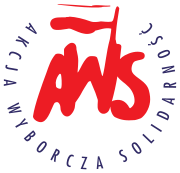 |
Solidarity Electoral Action Akcja Wyborcza Solidarność |
AWS | Marian Krzaklewski | Solidarism Christian democracy Social conservatism |
1996 | 2001 | Formation of party was connected with integration of post-Solidarity parties into a broad electoral block. AWS won 1997 parliamentary election gaining 33.83% of votes and 201 seats. It formed a coalition with UW, which collapsed in 2000. Chairman Marian Krzaklewski became AWS candidate in 2000 presidential election. His candidacy did not arouse general consensus - some activists were largely in favour of independent Andrzej Olechowski. Krzaklewski won 15.57% of votes, finishing third. In 2001 liberal wing left AWS and joined new party PO, created by a part of former UW politicians. Trade union NSZZ "Solidarity" decided not to participate in political structures anymore. Activists associated with the Kaczyński brothers created another new party - PiS. Christian-national wing joined LPR. As a result of parliamentary election in 2001, AWS failed to cross the 8% threshold required to gain entry to the Sejm as coalition, receiving only 5.60% of votes. Shortly afterwards, federation ceased to exist. | ||
| Conservative People's Party Stronnictwo Konserwatywno-Ludowe |
SKL | Jan Rokita | Liberal conservatism Christian democracy Agrarianism |
1997 | 2014 | Creation of party was result of merger of several small, moderately conservative parties. It was also joined by some former UW MPs. It quickly joined AWS. In 2001 party participated in elections by running from PO lists. The most important politicians (including future President Bronisław Komorowski) joined PO and SKL became marginal. In 2014 party joined Agreement. | |||
| Polish Labour Party Polska Partia Pracy |
PPP | Bogusław Ziętek | Marxism Trotskyism Anti-capitalism |
EACL | 2001 | 2017 | Small party of the extreme left. Despite lack of electoral successes, it managed to run in elections many times and gain recognition. | ||
| Democratic Party – democrats.pl Partia Demokratyczna – demokraci.pl |
PD | Władysław Frasyniuk | Liberalism Social liberalism Progressivism |
ALDE | 2005 | 2016 | Party was supposed to become an extension of UW by politicians coming from the left, social democratic Prime Minister Marek Belka was one of its founders. Some notable politicians did not join the new party. In 2005 parliamentary election PD did not reach the electoral threshold, obtaining the result of 2.45% of votes. In the following years, party unsuccessfully joined several centre-left electoral coalitions. In 2016 PD was renamed to UED. 4 MPs of PO joined new party. | ||
| Poland Comes First Polska Jest Najważniejsza |
PJN | Paweł Kowal | Conservative liberalism Liberal conservatism Christian democracy |
ACRE | 2010 | 2013 | Party was founded by liberal wing of PiS, which did not agree with its economic policy. In 2011 parliamentary election PJN received 2.19% of the votes, which did not allow it to obtain seats in the Sejm. In 2013 party joined Agreement. | ||
Defunct parties of People's Republic of Poland
| Logo | Party | Leader | Ideology | European affiliation | Founded | Dissolved | Comments | ||
|---|---|---|---|---|---|---|---|---|---|
 |
Polish United Workers' Party Polska Zjednoczona Partia Robotnicza |
PZPR | Bolesław Bierut (first) | Communism Marxism-Leninism |
Cominform | 1948 | 1990 | PZPR was established at unification congress of PPR and PPS during meetings in 1948. Unification was possible because PPS activists who opposed it had been forced out of party. PZPR ruled Poland in the years until 1989. During semi-free election this year communists won 65% of seats in the Sejm, though seats won were guaranteed and PZPR was unable to gain a majority, while 99 out of 100 seats in Senate freely contested were won by Solidarity-backed candidates. Jaruzelski won presidential ballot by one vote. In 1990 PZPR was renamed to SdRP. | |
 |
United People's Party Zjednoczone Stronnictwo Ludowe |
ZSL | Władysław Kowalski (first) | Agrarian socialism Peasant movement |
1949 | 1989 | Party was formed from the merger of communist SL with remnants of the independent PSL of Stanisław Mikołajczyk. ZSL became – as intended from its beginning – a satellite party of PZPR, representing it in rural areas. In 1989 after victory of Solidarity in legislative elections together with PZPR's other satellite party, SD, ZSL decided to support opposition. At party congress ZSL merged with anti-communist PSL in exile, forming today's PSL. SD exists until now. | ||
Defunct and historical political parties in the Second Polish Republic, 1918–39
- Agudath Israel
- Bloc of National Minorities – Blok Mniejszosci Narodowych
- Bund (General Jewish Labor Union)
- Camp of National Unity – Obóz Zjednoczenia Narodowego, OZN ("Ozon", continuation of BBWR, nationalist)
- Centrolew, "Center-Left" – coalition of parties.
- Chjeno-Piast – coalition of that included the Polish People's Party "Piast" and Christian Association of National Unity
- Christian Democracy – Labor Party – Chrześcijańska Demokracja (ChD)
- Communist Party of Poland – Komunistyczna Partia Polski, KPP – (communist, illegal)
- Folkspartei – Jewish People's Party ('Folkists')
- German Socialist Labour Party of Poland – (German: Deutsche Sozialistische Arbeitspartei Polens, abbreviated DSAP, Polish: Niemiecka Socjalistyczna Partia Pracy w Polsce)
- Labor Party – Stronnictwo Pracy, SP
- National Democracy – Narodowa Demokracja, ND ("Endecja") (nationalist)
- Popular National Union – Związek Ludowo-Narodowy, ZLN
- National Party – Stronnictwo Narodowe, SN
- National Radical Camp – Obóz Narodowo-Radykalny, ONR (extreme-right)
- National Radical Camp ABC
- National Radical Camp Falanga – Obóz Narodowo-Radykalny Falanga or Falanga
- National Workers' Party – Narodowa Partia Robotnicza, NPR
- Nonpartisan Bloc for Cooperation with the Government – Bezpartyjny Blok Współpracy z Rządem, BBWR (organization of Sanacja)
- Peasant Party – Stronnictwo Chłopskie, SCh
- People's Party – Stronnictwo Ludowe, SL
- Polish People's Party PSL – Polish People's Party (agrarians)
- Polish People's Party "Piast"
- Polish People's Party "Wyzwolenie"
- Polish Socialist Party – Polska Partia Socjalistyczna, PPS (socialist)
- Polish Socialist Party – Revolutionary Faction – Polska Partia Socjalistyczna – Frakcja Rewolucyjna
- Polish Socialist Party – Left – Polska Partia Socjalistyczna – Lewica
- Sanation – Sanacja (meant to "restore health" to the body politic: authoritarian, centrist)
- Ukrainian National Democratic Alliance – (UNDO) (Ukrainian: Українське національно-демократичне об'єднання, УНДО, Ukrayin'ske Natsional'no-Demokratichne Obyednannia, Polish: Ukraińskie Zjednoczenie Narodowo-Demokratyczne)
- Związek Chłopski ZCh (Polish Wikipedia article)
Defunct and historical parties Political parties before 1918
- Polish Social Democratic Party – Polska Partia Socjaldemokratyczna (PPS) (1890-1919)
- Polish Socialist Party – Polska Partia Socjalistyczna (1892-1948)
- Social Democracy of the Kingdom of Poland and Lithuania – Socjaldemokracja Krolestwa Polskiego i Litwy, SDKPiL (1893-1918)
- Polish Socialist Party of the Prussian Partition - Polska Partia Socjalistyczna Zaboru Pruskiego (1893-1919)
- Polish Socialist Party – Revolutionary Faction - Polska Partia Socjalistyczna - Frakcja Rewolucyjna (1893-1918)
- National-Democratic Party (Poland) – Stronnictwo Narodowo-Demokratyczne (1897-1919)
- National Workers' Union - Narodowy Związek Robotników (1905-1920)
- Polish Socialist Party – Left - Polska Partia Socjalistyczna - Lewica (1906-1918)
- Christian Democratic Party - Stronnictwo Chrześcijańskiej Demokracji (1919-1937)
- Polish Socialist-Democratic Party of Galicia and Cieszyn Silesia - Polska Partia Socjalno-Demokratyczna Galicji i Śląska Cieszyńskiego
- Progressive-Democratic Union – Związek Postępowo-Demokratyczny
- Real Politics Party – Stronnictwo Polityki Realnej
- Polish People's Party – Polskie Stronnictwo Ludowe
- National Workers' Faction - Narodowe Stronnictwo Robotników
- Peasantry Union - Związek Stronnictwa Chłopskiego
- Popular Christian Party - Stronnictwo Chrześcijańsko-Ludowe
- Polish Popular Centre - Polskie Centrum Ludowe
See also
- Politics of Poland
- List of political parties by country
- List of politicians in Poland
- Timeline of liberal parties in Poland
References
- https://platforma.org/aktualnosci/borys-budka-przewodniczacym-platformy-obywatelskiej
- "Władze partii". Partia Zieloni (in Polish). Retrieved 6 May 2020.
- https://www.druga-rzeczpospolitapolska.pl/partia-ii-rp
Further reading
- Dariusz Cecuda, Leksykon Opozycji Politycznej 1976-1989, BIS Trust, Warszawa 1989
- Małgorzata Dehnel-Szyc, Jadwiga Stachura, Gry polityczne. Orientacje na dziś, Oficyna Wydawnicza Volument, Warszawa 1991
- Piotr Frączak (e.d), Gorączka czasu przełomu. Dokumenty ugrupowań radykalnych 1989-1990, Instytut Studiów Politycznych Polskiej Akademii Nauk, Wydawnictwo Adam Marszałek, Warszawa 1984
- Inka Słodkowska (ed.), Programy partii i ugrupowań parlamentarnych 1989-1991' vol. 1-2, Instytut Studiów Politycznych Polskiej Akademii Nauk, Warszawa 1995